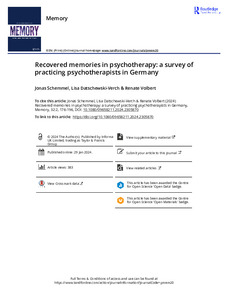Recovered memories in psychotherapy: a survey of practicing psychotherapists in Germany
| dc.date.accessioned | 2024-03-13T09:26:10Z | |
| dc.date.available | 2024-03-13T09:26:10Z | |
| dc.date.issued | 2024-01-29 | |
| dc.identifier | doi:10.17170/kobra-202403139762 | |
| dc.identifier.uri | http://hdl.handle.net/123456789/15550 | |
| dc.description.sponsorship | Gefördert im Rahmen des Projekts DEAL | |
| dc.language.iso | eng | |
| dc.rights | Attribution-NonCommercial-NoDerivatives 4.0 International | * |
| dc.rights.uri | http://creativecommons.org/licenses/by-nc-nd/4.0/ | * |
| dc.subject | psychotherapy | eng |
| dc.subject | false memories | eng |
| dc.subject | suggestive therapy | eng |
| dc.subject | suggestion | eng |
| dc.subject | recovered memories | eng |
| dc.subject.ddc | 150 | |
| dc.title | Recovered memories in psychotherapy: a survey of practicing psychotherapists in Germany | eng |
| dc.type | Aufsatz | |
| dcterms.abstract | We report on a survey of 258 psychotherapists from Germany, focusing on their experiences with memory recovery in general, suggestive therapy procedures, evaluations of recovered memories, and memory recovery in training and guidelines. Most therapists (78%) reported instances of memory recovery encompassing negative and positive childhood experiences, but usually in a minority of patients. Also, most therapists (82%) reported to have held assumptions about unremembered trauma. Patients who held these beliefs were reported by 83% of the therapists. Both therapist and patient assumptions reportedly occurred in a minority of cases. Furthermore, 35% of participants had used therapeutic techniques at least once to recover presumed trauma memories. Only 10% reported assuming trauma in most patients and recovering purported memories in a majority of the attempts. A fifth believed memory recovery was a task of psychotherapy. This belief correlated with trauma assumptions, memory recovery attempts, and recovery frequency. Psychodynamic therapists more often reported to assume trauma behind symptoms and agreed more with problematic views on trauma and memory. No differences showed regarding suggestive behaviour in therapy. Most participants expressed interest in receiving support on dealing with memory recoveries. This interest should be taken up, ideally during therapist training. | eng |
| dcterms.accessRights | open access | |
| dcterms.creator | Schemmel, Jonas | |
| dcterms.creator | Datschewski-Verch, Lisa | |
| dcterms.creator | Volbert, Renate | |
| dc.relation.doi | doi:10.1080/09658211.2024.2305870 | |
| dc.subject.swd | Deutschland | ger |
| dc.subject.swd | Psychotherapie | ger |
| dc.subject.swd | Erinnerung | ger |
| dc.subject.swd | Umfrage | ger |
| dc.subject.swd | Psychisches Trauma | ger |
| dc.subject.swd | Suggestion | ger |
| dc.type.version | publishedVersion | |
| dcterms.source.identifier | eissn:1464-0686 | |
| dcterms.source.issue | Issue 2 | |
| dcterms.source.journal | Memory | eng |
| dcterms.source.pageinfo | 176-196 | |
| dcterms.source.volume | Volume 32 | |
| kup.iskup | false |
Files in this item
This item appears in the following Collection(s)
-
Artikel [1169]


